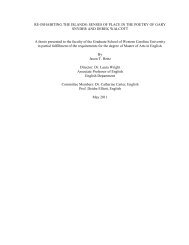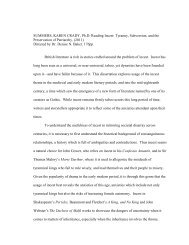Song Character Analysis Worksheet - The University of North ...
Song Character Analysis Worksheet - The University of North ...
Song Character Analysis Worksheet - The University of North ...
Create successful ePaper yourself
Turn your PDF publications into a flip-book with our unique Google optimized e-Paper software.
possibilities for manipulation and abuse by performers. Plato’s writings are most<br />
vehement in his distrust <strong>of</strong> musicians to subvert the status quo. <strong>The</strong>se arguments<br />
established the debate between cerebral logic (a masculine attribute) and emotional<br />
feeling (a feminine attribute) made manifest in musical interpretation and reception that<br />
continue today. 4 Feminist criticism argues against this traditional duality <strong>of</strong> mind and<br />
feeling for building social constructs, such as musical performance. According to Wayne<br />
Bowman, such “patriarchal thought . . . tends to depersonalize experience” and results in<br />
the “binary opposition” <strong>of</strong> self and other. 5 This debate has already been discussed in<br />
Chapter Three regarding societal gender roles.<br />
A modern philosophy <strong>of</strong> music as feminine and, therefore, subversive to<br />
traditional gender roles is found in John Shepherd’s Music as Social Text. He identified<br />
sound as a tactile sensory stimulus that “stresses the integrative and relational”; sound<br />
surrounds us and provokes a reaction. 6 This challenges the hegemonic experience for<br />
that is “essentially a visual experience.” A visual response to art allows distance and<br />
separation, with objectivity and contemplative scrutiny. A sound experience, however,<br />
requires an embodied response. It is “fundamentally tactile: touching, probing, intruding,<br />
4 See Wayne D. Bowman, Philosophical Perspectives on Music (New York: Oxford <strong>University</strong><br />
Press, 1998). Chapter 2 is a summary <strong>of</strong> Greek philosophy regarding music’s mimetic qualities and a<br />
description <strong>of</strong> the transformative powers and gendered identity <strong>of</strong> the “honeyed muse.”<br />
5 Bowman, 361. Sets <strong>of</strong> binary oppositions that reflect the spiraling associations in building<br />
personal reality constructs are listed as male/female, reason/emotion, mind/body, good/evil, and<br />
culture/nature. <strong>The</strong>se associations ultimately result in the assessment <strong>of</strong> “under control/out <strong>of</strong> control” with<br />
its implicit gender prejudices. See Musicology and Difference: Gender and Sexuality in Music Scholarship,<br />
ed. Ruth Solie (Berkeley: <strong>University</strong> <strong>of</strong> California Press, 1993), 11. Another patriarchal binary<br />
system is the perpetuation <strong>of</strong> hegemonic gender roles through musical interpretation and aesthetic. Heide<br />
Göttner-Abendroth proposed a counter “matriarchal aesthetic” in <strong>The</strong> Dancing Goddess: Principles <strong>of</strong> a<br />
Matriarchal Aesthetic, trans. Maureen T. Krause (Boston: Beacon Press, 1991).<br />
6 “Music and Male Hegemony” (Cambridge, UK: Polity Press, 1991), 159.<br />
84

















